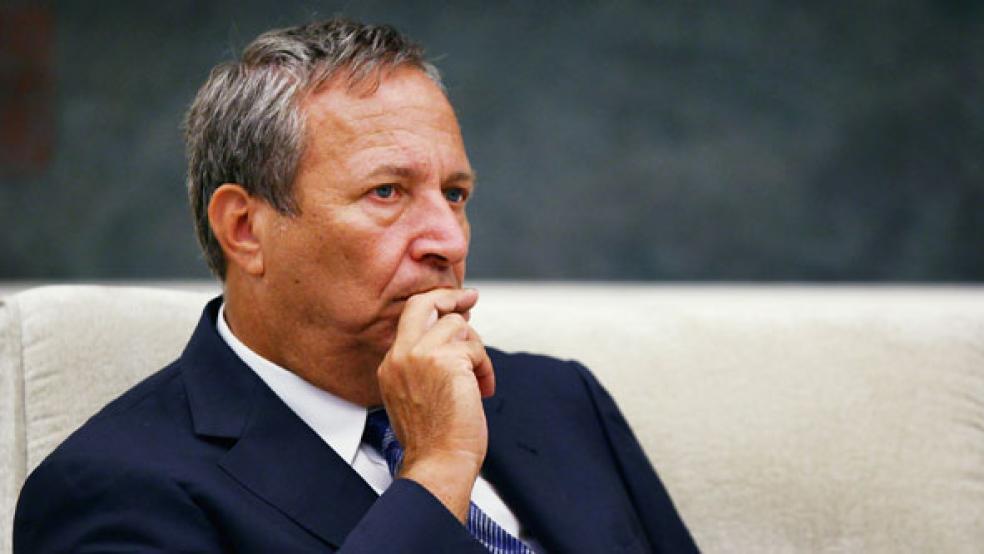Former U.S. Treasury Secretary Lawrence Summers never came near the Federal Reserve's annual monetary policy symposium in Jackson Hole this weekend, but his name was often raised on the sidelines amid speculation over his possible selection as the next Fed chairman. How would Summers, a Harvard professor with a formidable reputation for brilliance but no patience for people he disagrees with, treat his Fed colleagues?
 How was fellow candidate Fed Vice Chair Janet Yellen, who moderated the discussion on Saturday, standing up to the pressure of competing with him?
How was fellow candidate Fed Vice Chair Janet Yellen, who moderated the discussion on Saturday, standing up to the pressure of competing with him? When will President Barack Obama make up his mind on who he wants to nominate, and has the drawn-out process over the selection done any harm to the institution's morale?
RELATED: HOW THE SUMMERS LEAK PAVES THE WAY FOR JANET YELLEN
Summers, Yellen and former Fed Vice Chair Don Kohn are among the candidates Obama is considering to replace Fed chief Ben Bernanke when his terms ends in January.
At the prestigious central banker's retreat in Wyoming's stunning Grand Teton National Park which wrapped up on Saturday, both Yellen and Kohn, who also attended, steered away from discussing Bernanke's succession with reporters. Yellen, clearly aware of being under intense media scrutiny, seemed determined not to say anything that could be construed as news in her public remarks. The rules of the event dictate that anything said during the sessions is on the record, and everything else is off the record, unless otherwise agreed.
Kohn joked with reporters about the lack of campaigning on his behalf, in contrast to the full-scale lobbying being done for Summers and Yellen, but otherwise declined to comment.
WHAT IS SUMMERS' STRATEGY?
Several Fed officials, who asked to remain anonymous out of concern they may soon be working with Summers, viewed the one-time Obama adviser as the president's clear favorite, but wondered what sort of chairman he would make.
"Has he devised a strategy to be effective within the institution?" one asked.
Some insiders worried that Summers' close ties to Wall Street and the public defense the president has offered of his credentials could be a problem for an institution that is supposed to be above the political fray.
RELATED: CAN THE FEDERAL RESERVE STOP WALL STREET'S FREAK OUT?
One was concerned it could turn out like the Fed under Arthur Burns in the 1970s, a dominant chairman and a scholar of business cycles, was unable to resist White house pressure, leading to policy mistakes and damaging high inflation.
Burns, Fed chairman from 1970 to 1978, is viewed critically by historians for caving in to pressure from President Richard Nixon to keep monetary policy easy to aid Nixon's re-election, resulting in higher inflation.
There was also curiosity about how the central bank's policy-setting committee might evolve under Summers' leadership. "He could be a step forward from Bernanke, just as Bernanke was a step forward from (his predecessor Alan) Greenspan. Bernanke doesn't cut off debate, as Greenspan did, but you don't always get to hear what he thinks. He doesn't always engage," the first official said.
YELLEN: TOO DOVISH?
Call it loyalty to one of their own, but there was also a sense of disappointment that Yellen might be passed over despite her strong credentials and standing as a top economist, even if her views on policy might be too dovish for some.
"Why not Janet? I don't get it. She would be Obama's legacy. Instead, if it is Summers, his legacy is that he only trusts middle-aged white guys," said another senior official.
Yellen might not have said anything during the conference that spoke to monetary policy, but one quality did emerge that observers said was first-class qualification to chair the Fed.
Despite a room full of some of the biggest egos in central banking who are notoriously fond of the sound of their own voice, she got the event to run on time.




